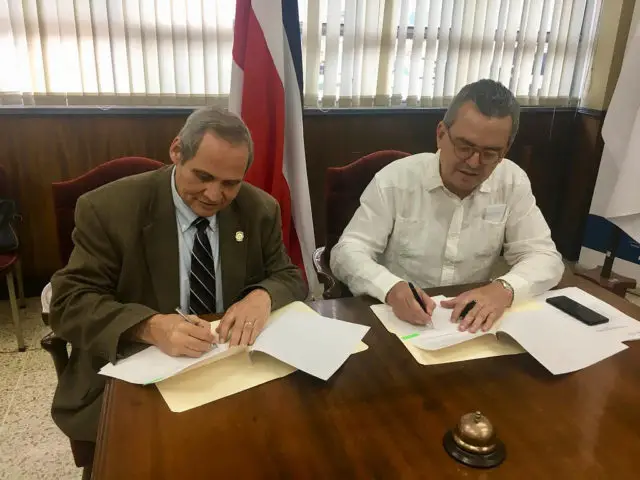
As part of the different contingency plans that the government of the Republic has been designing for addressing the emergency caused by COVID-19, the Ministry of Agriculture, together with other state institutions, has also developed a set of measures to help micro, small and medium agricultural producers.
The measures are aimed to achieve three purposes:
1) Slow the progress of the pandemic.
2) Avoid the economic slowdown in the agricultural sector.
3) Prevent food shortages in the Costa Rican population.
For these to be put into effect, direct communication and coordination have been established between representatives of the agro-food sector and the economic council of the.
Measures were taken by the Ministry of Agriculture and Cattle (MAG).

In the MAG regional offices, the validation of procedures by electronic means has been prioritized and for those who are under isolation measures, procedures will be waived while they are in this condition.
For small and medium agricultural producers, certificates for the special agricultural regime corresponding to the 2019 period will be issued, and also this same document will serve to verify in the different official instances the status in which they are
Also, farmer fairs have continued to function by applying contagion mitigation measures in them.
SENASA and SFE measures.
The National Animal Health Service (SENASA) will suspend the processing of Veterinary Operation Certificates (CVO) for two months. The State Phytosanitary Service (SFE), attention is maintained at border posts, without increasing the risk of users and collaborators, to reduce the impact on exports of the sector and the import of inputs for production.
To streamline the procedures for the entry of goods, digital documentation will be requested, as well as photocopies and printed documents.
About recommendations for livestock, establishments, transporters, and plant personnel must follow a series of protocols that have been sent to them, which have been implemented at auctions. The organic farms, certifiers and nurseries, the validity of the registries were extended until May 31, 2020.
Institute of Rural Development (INDER) guidelines.
For the 950 families that benefit from the Rural Credit Program, a moratorium will be applied for 4 months and, also, the collection of the arrears will be transferred to the end of the credit term, without interest.
On the other hand, an INDER- the National Production Council) CNP Alliance for the purchase of beans was signed.
Provisions took by the Comprehensive Program for Agricultural Marketing.
This includes both the National Center for Food Supply (CENADA) and the Chorotega regional market.
Both services are kept open under the following guidelines:
Total disinfection and cleaning of the facilities.
Proof of delivery to dealers and registered assistants to exempt them from the vehicle restriction.
Restriction of admission to people with cold symptoms or COVID-19.
Contributions to the emergency by CNP – National Liquor Factory (FANAL).
The National Production Council, through its collaboration in this emergency, has guaranteed that 1,436 educational centers of the Ministry of Public Education receive the necessary food supply, thus guaranteeing that many students who receive them are not affected by the suspension of this service.
For its part, FANAL, also has a key role in this process. It effectively implemented the production of seven million liters of Alcohol, which guarantees the supply to the health centers of the Costa Rican Social Security Fund and direct distribution to consumers through an alliance with Correos de Costa Rica.
Measures were taken by INCOPESCA.
The Costa Rican Institute of Fisheries (INCOPESCA), together with related institutions and organizations, organizes a campaign for the consumption of seafood during this situation.
For the fishing boats, an exception was approved so that they can go out to sea and thus avoid the paralysis of their activity, at the same time, in conjunction with the private sector; the donation of food is given to the families of these fishermen.
In coordination with the CNP and the MAG, fish products are included in the basic food package of the Institutional Supply Plan (PAI).
INFOCOOP Agreements.
About the important cooperative productive sector, the Cooperative Development Institute (INFOCCOP) has a monitoring system that allows follow-up for those that have been hit hardest by the crisis.
Moratoriums are established in the payments of commitments to those that have been most affected and, according to the urgency, rescue plans will be applied for those that require it.
Banking sector initiatives.
For those who have received financial support from the National Development Fund (FONADE), a bill was presented for the cancellation of financial obligations, which will benefit 2,705 small, micro and medium producers (SMEs).
In addition to the above, there is a grace period of up to twelve months in the payment of capital in operations financed by FONADE.
Adding to this support, banking for Development opens the channeling of credits to SMEs.
Additional measures are taken.
The Ministry of Environment and Energy (MINAE) is going to waiver a term in the concession of water use.
The Costa Rican Social Security Fund will apply the flexibility for the adjustments to the payment agreements and postponed the collection procedures until June 30th.
The Ministry of Labor and Social Security (MTSS) has reached agreements to reduce the working day by up to 50% when gross income is reduced due to COVID-19, during April, May, and June.
With all these measures, State institutions want to make the re-activation of the country more agile, for overcoming the partial or total paralysis to which the different productive sectors have been subjected.

